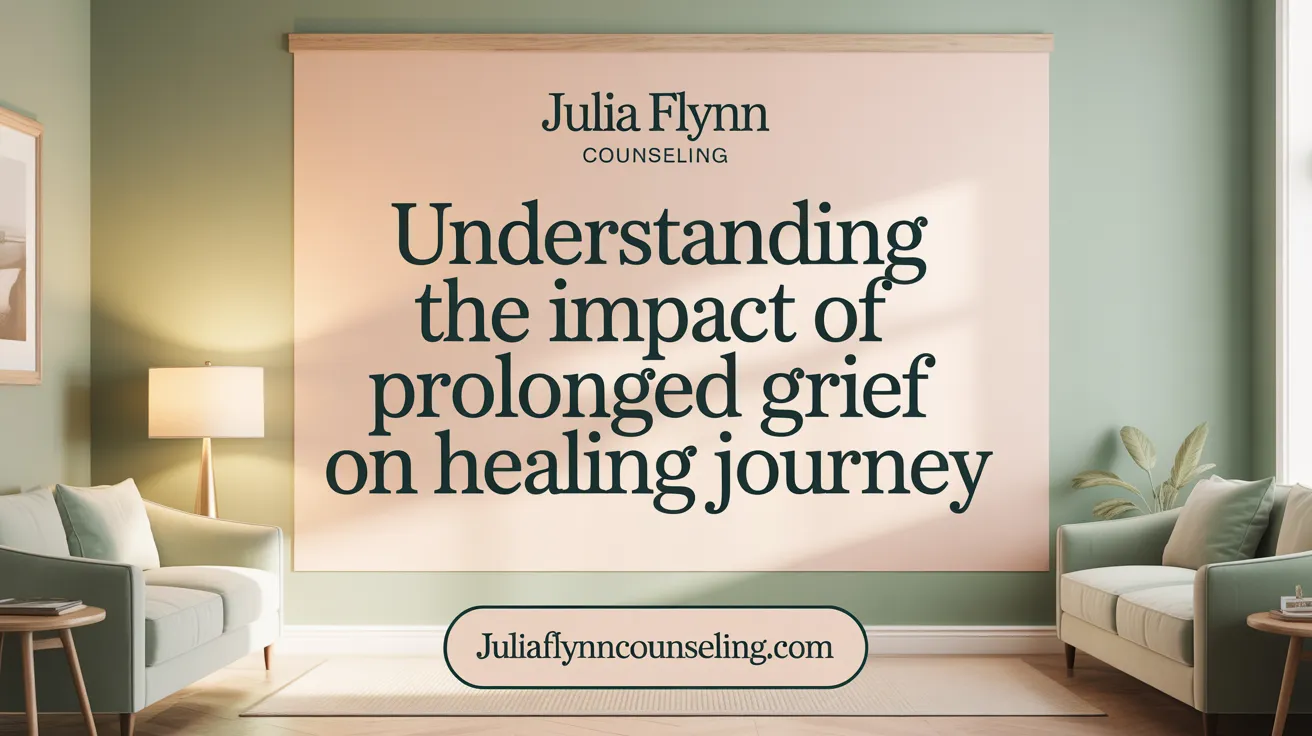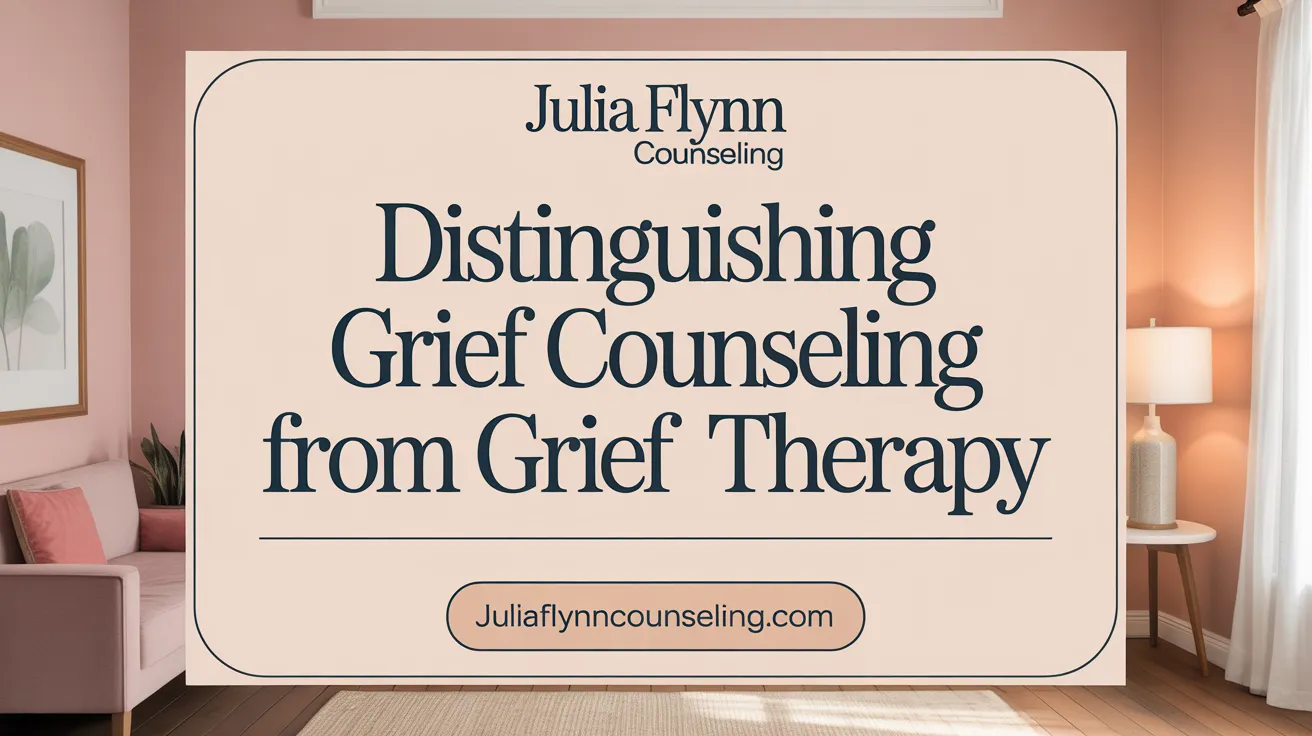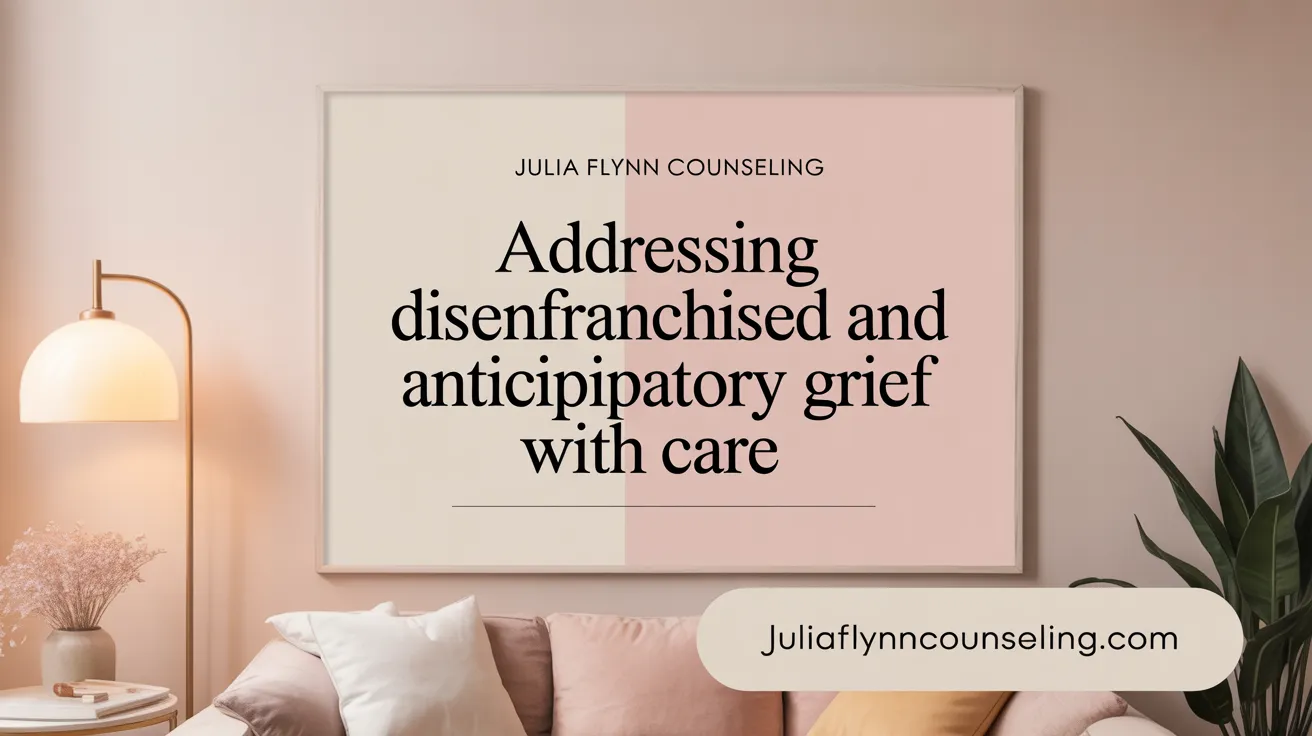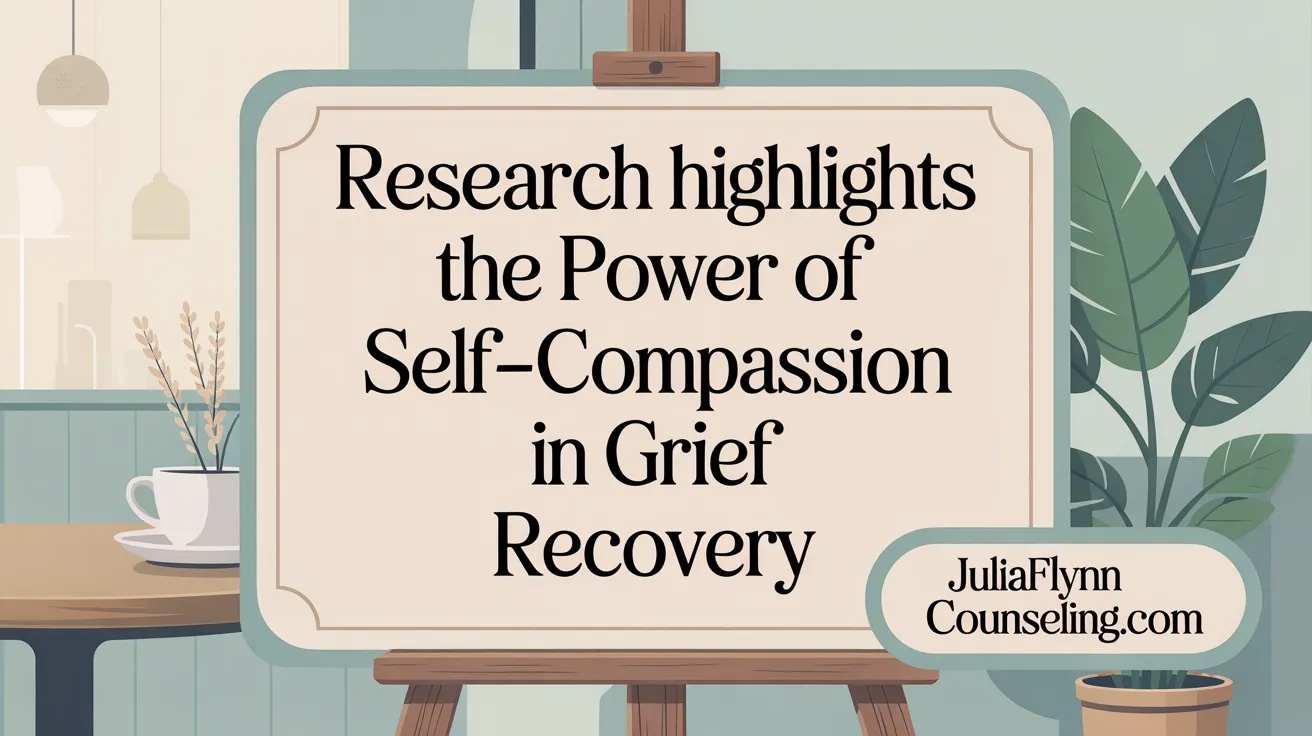Understanding the Nature of Grief and the Role of Counseling
Definition and Emotional Impact of Grief
Grief is a natural emotional response to loss that can involve a wide range of feelings such as sadness, anger, guilt, disbelief, and anxiety. It often presents with physical symptoms like fatigue, sleep disturbances, and changes in appetite. This emotional suffering is a deeply personal experience and varies greatly from person to person.
Common Sources of Grief
Grief may arise not only from bereavement—the death of a loved one—but also from other significant life changes, including divorce, loss of a pet, serious illness, job loss, retirement, miscarriage, or moving. Recognizing these diverse sources is crucial for understanding the scope of grief.
The Importance of Recognizing Grief as an Individualized, Natural Process
Grieving is unique to each individual and does not follow a set timeline or a specific order of emotional stages. Acknowledging grief as a normal, natural, and highly individualized process helps reduce stigma and supports self-compassion during healing. Avoiding the urge to rush recovery fosters patience and emotional acceptance.
Role and Goals of Grief Counseling
Grief counseling provides a compassionate, safe space for individuals to explore and express their emotions. Its primary goal is to help clients accept the reality of the loss, process pain, adjust to life without their loved one, and find a way to maintain a meaningful connection while moving forward. Counseling empowers healing by normalizing grief responses and promoting healthy coping strategies that build resilience and facilitate emotional regulation.
Recognizing When Grief Counseling Is Needed

What Are the Signs Indicating the Need for Grief Counseling?
Grief manifests uniquely in each person, but there are clear signs that professional Signs You Need Grief Counseling might be necessary. Key indicators include prolonged or intense sadness, difficulty functioning in daily life, persistent emotional distress, and challenges coping with the loss. When grief interferes with your ability to maintain relationships, work, or self-care over an extended period, it is a signal that additional support could be beneficial. See more about Signs You Need Grief Counseling.
What Are Common Emotional and Physical Symptoms of Grief?
Grief often presents as a complex blend of Emotional Symptoms of Grief and Physical Symptoms of Grief. Emotionally, individuals may experience sadness, anger, guilt, anxiety, or numbness. Physically, manifestations can include fatigue, changes in appetite, sleep disturbances like insomnia, and even aches or headaches. Recognizing these symptoms helps in validating your experience and deciding when to seek grief counseling. For further detail check Emotional Symptoms of Grief and Physical Symptoms of Grief.
What Are Different Types of Grief, Including Anticipatory and Complicated Grief?
Anticipatory Grief occurs before a loss, such as when a loved one is terminally ill, allowing partial emotional preparation. In contrast, Complicated Grief is a prolonged, intense form of grief that severely disrupts daily functioning and emotional well-being. This type of grief may involve ongoing yearning, difficulty accepting the loss, and persistent distress, often requiring specialized counseling or therapy. For a comprehensive discussion of Types of Grief, see related resources.
How Does Prolonged Grief Impact Healing?
When grief remains unresolved over time, it can lead to Prolonged Grief Disorder, which significantly impairs emotional health and daily functioning. Delayed healing increases risks of depression, anxiety, and physical health problems. Timely grief counseling techniques can help by providing coping strategies, emotional support, and tools to process and accept loss, promoting healthier healing trajectories. Learn about Complicated Grief Therapy (CGT) and effective Grief Counseling Benefits for improving recovery.
Foundations of Compassionate Grief Counseling

What therapeutic space does grief counseling provide?
Grief counseling offers a specialized, supportive environment where individuals can safely explore and express their feelings following loss. It creates a space free of judgment that encourages open emotional expression, allowing clients to process their grief authentically and develop resilience. This supportive setting fosters connection and validation, enabling the bereaved to work through complex emotions and begin the healing journey.
What are the core principles in grief counseling?
Three foundational principles guide effective grief counseling:
- Active Listening: Attentive and compassionate hearing of the client’s story, allowing them to feel understood and respected.
- Empathy: A genuine understanding and sharing of the client's emotional experience without judgment.
- Validation of Emotions: Affirming the naturalness of all grief reactions, including sadness, anger, guilt, and anxiety, helping clients feel their feelings are acknowledged and accepted.
These principles ensure that clients feel safe and supported, laying the groundwork for emotional healing.
How does grief counseling normalize grief and provide psychoeducation?
Normalization in grief counseling involves educating clients about the common emotional and physical reactions to loss. This includes explaining that grief symptoms—such as sadness, fatigue, and mood swings—are natural and expected responses. Psychoeducation helps dismantle myths around grief, like the need to "get over it" quickly or that crying is the only way to grieve. Understanding the stages or tasks of grief, like accepting the reality of loss and processing pain, empowers clients to navigate their emotions and reduces feelings of isolation or shame.
How is grief counseling different from grief therapy?
Grief counseling generally supports individuals as they navigate typical grief reactions within a reasonable timeframe, focusing on adaptation and healthy coping. It employs techniques like talk therapy, mindfulness, and group support to facilitate acceptance and emotional regulation.
In contrast, grief therapy addresses complicated or prolonged grief reactions—such as persistent yearning or intense dysfunction—that may require specialized, structured interventions like Complicated Grief Therapy (CGT). Therapy is often longer-term and may involve more intensive work to help clients regain functionality and manage complex emotional difficulties.
By understanding these distinctions, clients and professionals can seek appropriate support tailored to the individual’s grief experience.
Theoretical Frameworks and Models Guiding Grief Counseling

Overview of Grieving Process Theories
Grief counseling draws on several well-established models to understand and guide the grieving process. One foundational framework is Elisabeth Kübler-Ross's five stages of grief: denial, anger, bargaining, depression, and acceptance. These stages describe common emotional responses but are experienced non-linearly and uniquely by each individual.
William Worden's tasks of mourning offer a practical approach, identifying four tasks: accepting the reality of the loss, processing the pain of grief, adjusting to a world without the deceased, and finding an enduring connection while moving on. This model guides clients to actively cope with change.
The Dual Process Model emphasizes oscillation between loss-oriented activities (focusing on grief, memories, and feelings) and restoration-oriented activities (adapting to new roles and daily life). It acknowledges the dynamic nature of grieving and supports balance.
Meaning-Making and Narrative Approaches
Narrative approaches encourage clients to find personal meaning in their loss by reconstructing their life story with the loss integrated. This process supports healing by fostering growth and helping clients create coherent narratives that honor the deceased while supporting their identity.
Meaning-making frameworks promote resilience by helping individuals interpret their grief experience, often facilitating a sense of purpose and continuity despite profound change.
Application of Models in Tailoring Grief Interventions
Counselors tailor interventions using these theories by assessing where clients are in their grieving process and adapting support accordingly. For example, active tasks from Worden’s model may shape therapeutic goals, while narrative techniques enable emotional expression and meaning reconstruction.
Integrating the Dual Process Model supports clients in balancing grief engagement with life adjustment, while recognizing that grieving is a fluid process.
Overall, employing these combined frameworks allows grief counseling to be personalized, fostering emotional regulation, acceptance, and resilience through targeted strategies aligned with each client’s needs and cultural context.
Evidence-Based Therapeutic Techniques in Grief Counseling

Cognitive Behavioral Therapy (CBT) and Complicated Grief Therapy (CGT)
CBT helps individuals reframe negative thoughts related to grief, allowing healthier emotional responses. It focuses on identifying and modifying unhelpful thinking patterns that can exacerbate sadness, guilt, or anger. CGT is tailored for complicated or prolonged grief, helping clients restore daily functioning and process deep emotional pain through structured sessions.
Acceptance and Commitment Therapy (ACT) and Mindfulness Practices
ACT encourages clients to accept their emotional experiences fully and commit to living according to their personal values despite the grief. Mindfulness practices, including meditation and relaxation techniques, support emotional regulation by fostering presence and reducing distress through awareness of the moment.
Narrative Therapy, Expressive Arts, and Role-Play
Narrative therapy aids clients in reconstructing the meaning of their loss by telling and reshaping their grief stories. Expressive arts such as drawing or writing provide creative outlets to process feelings. Role-play allows clients to explore unresolved emotions by simulating conversations or scenarios related to the deceased.
Use of Tools Like Writing Letters to the Deceased and Creating Memory Projects
Writing letters to the deceased enables clients to express unresolved feelings and gain closure. Memory projects, including creating memory books or online memorials, preserve the bond with the loved one and provide a tangible focus for healing and reflection.
These evidence-based approaches are often combined and personalized to meet individual needs, contributing to emotional healing, improved coping skills, and resilience during the grieving process.
Tailoring Grief Counseling to Individual and Cultural Needs

Understanding Cultural Variations in Grief Expression and Rituals
Grief experiences and expressions vary widely across cultures, influencing how individuals mourn and the rituals they observe. Cultural values shape mourning practices, emotional expression, and community support structures. Recognizing this diversity helps counselors provide respectful and effective support that honors each person's cultural background. For more information, see Culturally sensitive grief treatment.
Importance of Culturally Sensitive Grief Interventions
Culturally sensitive grief counseling tailors interventions to fit clients' cultural contexts, enhancing their relevance and effectiveness. Therapists may adapt treatment methods through surface changes, like language and customs, or deeper adaptations involving core beliefs and practices. Emphasizing cultural humility and formative research ensures interventions resonate meaningfully with diverse populations. Learn more about these approaches at Grief and Loss Counseling: Supporting Clients Through Grief.
Adapting Counseling Approaches to Age Groups
Effective grief support considers developmental stages:
- Children benefit from concrete language, rituals they can participate in, and emotional outlets like play therapy. See details on Grief counseling for children.
- Teens need safe spaces to express feelings, support for social dynamics, and acknowledgment of their unique grief experiences. For more, see Grief counseling for teens.
- Adults often process grief through sharing memories, cognitive therapy, and managing guilt. Overview available at How to Heal from Grief.
- Older Adults may face multiple losses and social isolation, requiring group therapy and attention to prolonged grief risks. Read about Grief Therapies for Older Adults.
Addressing Disenfranchised and Anticipatory Grief
Disenfranchised grief—when loss is unacknowledged or stigmatized—requires validation and tailored strategies to reduce isolation. Anticipatory grief, occurring before a loss such as terminal illness, benefits from counseling that prepares individuals emotionally, helping them face uncertainty and loss proactively. Both forms demand sensitive, individualized approaches within grief counseling. For further information, refer to Anticipatory Grief and Disenfranchised Grief and see Palliative Care Grief Counseling: A Supportive Journey.
Integrating Compassion Focused Therapy in Grief Support

Principles of Compassion Focused Therapy (CFT)
Compassion Focused Therapy (CFT) is an evidence-based approach that fosters self-compassion to help individuals cope with emotional pain. Rooted in evolutionary psychology, cognitive behavioral therapy, and attachment theory, CFT aims to balance emotional systems by cultivating kindness toward oneself, especially during difficult experiences like grief. Compassion Focused Therapy
Addressing Self-Criticism, Guilt, and Emotional Numbness with Self-Compassion
Grief often triggers harsh self-judgment, guilt, or emotional detachment. CFT guides clients to recognize these feelings as natural responses and to treat themselves with understanding and warmth. This shift from self-criticism to self-kindness helps reduce emotional distress and facilitates deeper healing. Compassion Focused Therapy
Techniques Such as Compassionate Imagery and Reasoning
Therapeutic strategies in CFT include compassionate imagery—inviting clients to visualize a caring presence or supportive figure—and compassionate reasoning, which nurtures a gentle and balanced inner dialogue. These techniques help regulate the threat response and promote soothing emotions in the grieving process. Compassion Focused Therapy
Research Supporting Benefits of Self-Compassion in Grief Healing
Studies demonstrate that practicing self-compassion during grief decreases symptoms of depression, anxiety, and stress. It empowers individuals to process loss more adaptively and supports psychological growth by fostering acceptance and resilience. Integrating CFT can thus enhance traditional grief counseling approaches by targeting emotional regulation and self-care through compassion. Compassion Focused Therapy
The Role of Self-Care and Social Support in the Healing Journey

Importance of Physical Self-Care: Rest, Nutrition, Exercise
Grief impacts both emotional and physical health, making physical self-care essential during recovery. Maintaining regular routines that include adequate rest helps manage fatigue and improves emotional resilience. Balanced nutrition nourishes the body, supporting energy levels and overall well-being. Gentle physical activities, such as walking or yoga, can reduce stress and enhance mood, aiding in coping with grief's physical symptoms like sleep disturbances and appetite changes. See also Physical Symptoms of Grief and Self-Care in Grief Counseling.
Emotional Self-Care Strategies: Journaling, Mindfulness, Creative Expression
Emotional self-care empowers individuals to process grief constructively. Journaling offers a private space to express feelings, organize thoughts, and track healing progress. Mindfulness and relaxation practices including meditation and deep breathing, cultivate present-moment awareness, helping to regulate overwhelming emotions and foster acceptance. Creative outlets such as art, music, or writing letters to the deceased can provide meaningful ways to honor loss and facilitate emotional release.
Utilizing Support Systems: Family, Friends, Support Groups
Connecting with supportive people reduces feelings of isolation and normalizes grief experiences. Family and friends provide empathy and companionship, while support groups for grief offer shared understanding and specialized guidance in a safe setting. Professional grief counseling complements these supports by addressing complex emotions and tailoring coping strategies to individual needs.
Preparing for Emotional Triggers Like Anniversaries and Holidays
Significant dates such as anniversaries and holidays can intensify grief reactions. Planning ahead by creating personal rituals, setting boundaries around social activities, or scheduling additional support helps manage emotional triggers. Recognizing and accepting these challenges as part of the journey allows for compassionate self-care during vulnerable times.
Accessing Grief Counseling Services and Overcoming Barriers

Finding qualified grief counselors and therapists
Finding the right grief counselor is an important step in the healing journey. Seek professionals verified by trusted sources like Psychology Today or local mental health organizations. Licensed therapists specializing in grief often have training in evidence-based approaches, including Cognitive Behavioral Therapy (CBT), Compassion Focused Therapy (CFT), and Complicated Grief Therapy (CGT). Referrals from healthcare providers, support groups, or bereavement programs can also guide you to qualified counselors.
Availability of online and telehealth grief counseling
Online grief counseling has grown in availability, making support accessible regardless of location. Many therapists provide HIPAA-compliant telehealth services, offering flexible scheduling and privacy. Digital platforms may also offer grief support groups, memorial websites, and virtual therapy sessions, providing comfort and connection from home. This mode of delivery is especially helpful for individuals with mobility challenges, in rural areas, or during times of social distancing.
Sliding scale fees and insurance options
Financial concerns should not prevent access to grief counseling. Many therapists offer sliding scale fees based on income, making sessions more affordable. Additionally, some insurance plans cover grief counseling, especially when provided by licensed professionals. Confirm coverage details before starting therapy, and inquire about upfront payment options and receipts for insurance reimbursement to ease the process.
Overcoming stigma and encouraging help-seeking behavior
Stigma around grief and mental health can discourage individuals from seeking support. It's important to recognize that grief is a natural response to loss and that counseling provides a safe, non-judgmental space to process emotions. Educational efforts, personal stories, and supportive communities can reduce shame and promote healing. Encouraging open conversations about grief and normalizing therapy helps individuals feel empowered to access professional help when needed.
Measuring Progress and Sustaining Healing in Grief Counseling

Use of Assessment Tools Like Hogan Grief Reaction Checklist and Inventory of Complicated Grief
Grief counselors commonly use standardized tools such as the Hogan Grief Reaction Checklist and the Inventory of Complicated Grief to assess clients' emotional states. These instruments help evaluate the severity and type of grief, monitor changes over time, and guide the tailoring of therapeutic interventions.
Tracking Emotional and Functional Improvements
Regular use of assessment tools enables clinicians to track improvements not only in emotional symptoms like sadness and anxiety but also in daily functioning and coping abilities. Monitoring progress helps ensure that therapy is responsive to clients' evolving needs and supports their adaptation to life after loss.
Tracking Progress in Grief Therapy
Prevention of Relapse and Managing Setbacks
Grief counseling incorporates strategies to anticipate and manage potential setbacks, such as periods of intensified sorrow around anniversaries or triggers. By reinforcing healthy coping skills and preparing clients for emotional fluctuations, counselors help prevent relapse into prolonged or complicated grief.
Relapse Prevention Strategies
Counselor Self-Care and Ongoing Professional Development
Maintaining counselor well-being through self-care, supervision, and continuous education is vital. This protects against burnout, vicarious trauma, and compassion fatigue, ensuring counselors remain effective and empathic in supporting clients through the challenging grief process.
Counselor Self-Care and Burnout Prevention
Embracing Healing Through Compassionate Grief Counseling
The Benefits of Grief Counseling
Grief counseling provides a compassionate, supportive space to process the complex emotions that arise from loss. It helps individuals understand and validate their feelings while developing effective coping strategies. Through techniques such as cognitive behavioral therapy, mindfulness, and support groups, grief counseling promotes emotional regulation, acceptance of loss, and strengthens one’s support network.
Personalized Healing Journeys
Everyone experiences grief uniquely, with no fixed timeline or "right" way to heal. Compassionate grief counseling respects this individuality, tailoring approaches to meet each person’s emotional needs and circumstances. A counselor guides clients through stages such as accepting the reality of loss and adjusting to life without the loved one, all while fostering a safe environment to express emotions.
Building Resilience and Hope
Grief counseling not only helps individuals cope but also opens the path toward posttraumatic growth. Clients often discover new meaning and personal strength through their healing journey. Encouraged by self-compassion and supportive techniques, many find resilience blossoms, enabling them to reconnect with life and carry forward lasting bonds with those they’ve lost.
